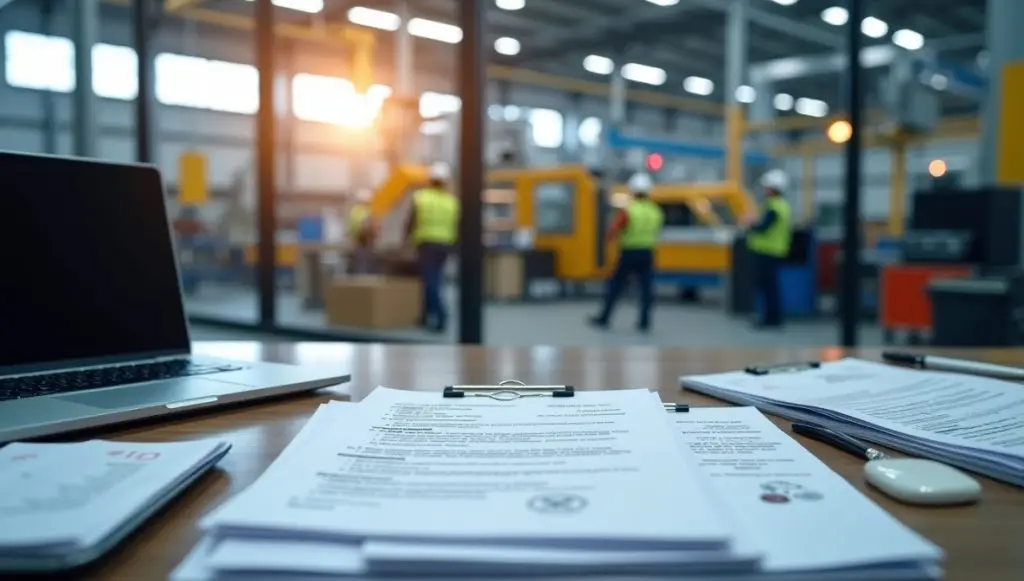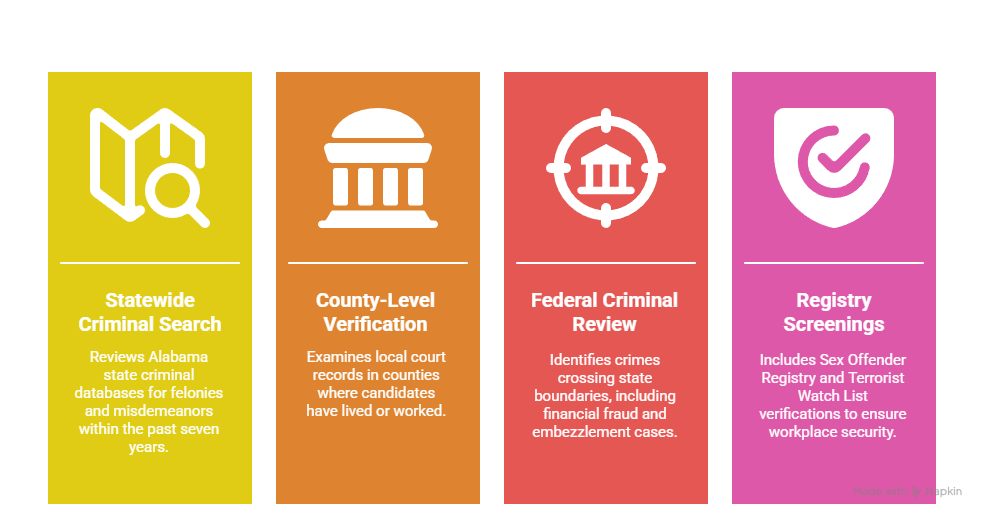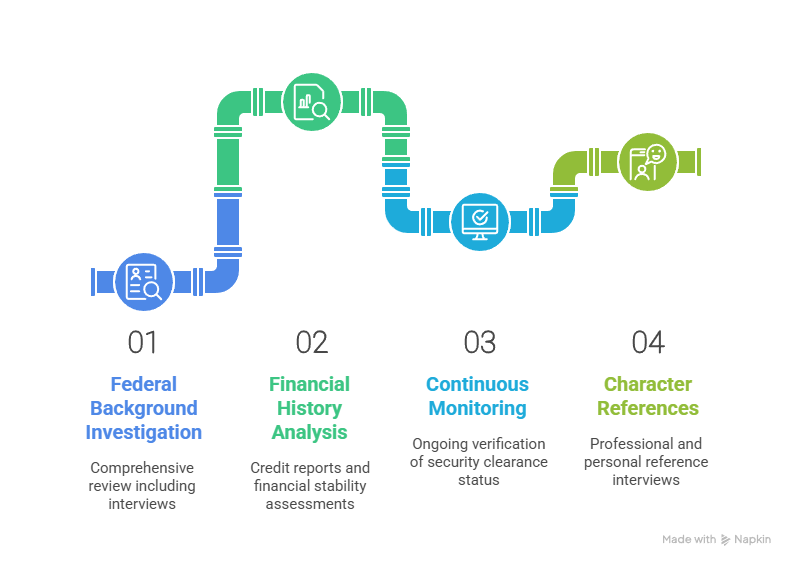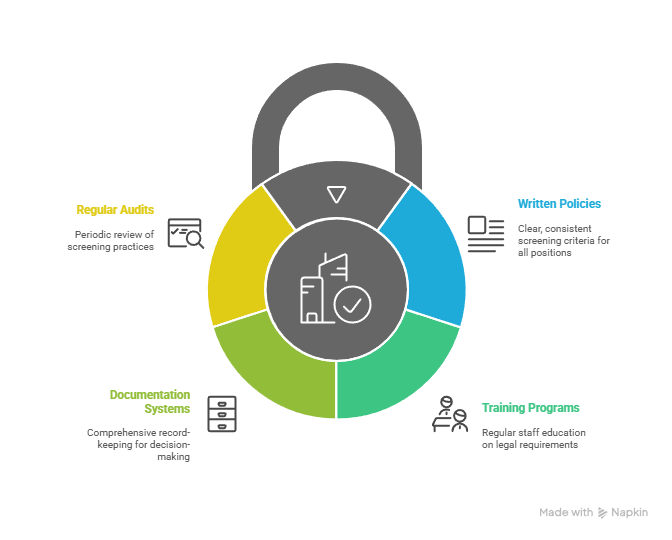Alabama manufacturing background checks require comprehensive compliance with federal E-Verify mandates, AIDT training standards, and HB 56 immigration documentation, creating a multi-layered verification process that spans 3-10 business days and costs $50-500 depending on position sensitivity. Success in Alabama's manufacturing sector demands systematic screening programs that balance FCRA/EEOC legal requirements with industry-specific safety standards, particularly for automotive and aerospace positions requiring enhanced security clearances.
Key Takeaways
- Mandatory E-Verify compliance is required for all Alabama manufacturing employers, with Form I-9 completion within three business days and immediate database verification against federal records.
- HB 56 immigration law demands comprehensive documentation retention including E-Verify printouts, Form I-9 records, and employee identification documents stored in secure, audit-ready formats.
- AIDT pre-training screening includes criminal history checks at local, state, and federal levels plus Social Security verification and mandatory drug testing before workforce development program entry.
- Industry-specific requirements vary significantly, with automotive manufacturing focusing on 7-year criminal history and MVR checks, while aerospace/defense positions require federal security clearances and continuous monitoring.
- Background check timelines typically span 3-10 business days with costs ranging from $50-100 for basic screening to $500+ for specialized defense manufacturing positions requiring federal investigations.
- Technology integration through automated systems reduces manual errors, provides real-time tracking, and ensures FCRA/EEOC compliance while streamlining the entire verification process for better candidate experience.
Introduction
Alabama's manufacturing sector employs over 250,000 workers across automotive, aerospace, and industrial sectors, making it a cornerstone of the state's economy. To maintain operational excellence and regulatory compliance, Alabama manufacturing background checks have become increasingly sophisticated, incorporating federal verification systems with stringent state-specific requirements. Whether you're an HR professional navigating AIDT training requirements, an employer ensuring E-Verify compliance, or a job seeker preparing for the screening process, understanding Alabama's comprehensive background check framework is essential for success in today's competitive manufacturing landscape.
Understanding Alabama Manufacturing Background Check Requirement

Federal and State Compliance Framework
Alabama manufacturing employers must navigate a complex regulatory environment that blends federal standards with state-specific legislation. The Fair Credit Reporting Act (FCRA) governs consumer reporting procedures, while E-Verify mandates ensure work authorization verification for all new hires. State laws, particularly HB 56 immigration requirements, add additional layers of documentation and verification that manufacturers must carefully manage.
Manufacturing positions in Alabama demand meticulous attention to both federal guidelines and state regulations. Companies must establish systematic processes that address criminal history verification, employment eligibility confirmation, and immigration status compliance simultaneously, creating comprehensive screening protocols that protect both employers and employees.
AIDT Integration Requirements
Alabama Industrial Development Training (AIDT) programs establish baseline screening standards that align workforce development with industry needs. These requirements focus on skill verification while ensuring candidates meet legal and safety standards necessary for modern manufacturing environments. AIDT monitoring helps bridge the gap between employer expectations and training objectives, creating a more qualified and compliant workforce.
The integration of AIDT standards into manufacturing background checks ensures that training investments align with long-term employment viability. This systematic approach reduces turnover costs and enhances overall workforce quality across Alabama's manufacturing sector.
Key Components of Alabama Manufacturing Background Checks
Criminal History Verification
Comprehensive criminal background checks typically cover seven years of history, examining felony and misdemeanor convictions at multiple jurisdictional levels. Alabama manufacturers often extend searches to include federal crime databases, particularly for positions involving government contracts or sensitive materials handling. Registry checks against sex offender databases and terrorist watch lists provide additional security layers for high-risk manufacturing environments.
Screening scope and requirements encompass multiple verification levels to ensure comprehensive candidate assessment:

- Statewide criminal searches review Alabama state criminal databases for felonies and misdemeanors within the past seven years
- County-level verification examines local court records in counties where candidates have lived or worked
- Federal criminal reviews identify crimes crossing state boundaries, including financial fraud and embezzlement cases
- Registry screenings include Sex Offender Registry and Terrorist Watch List verifications to ensure workplace security
The evaluation process must consider job-relatedness and proportionality when assessing criminal history findings, with minor offenses potentially having less impact on general manufacturing positions compared to serious crimes involving theft, violence, or substance abuse.
Employment Eligibility and E-Verify Compliance
Employment eligibility verification represents a non-negotiable component of Alabama manufacturing hiring, combining Form I-9 completion with mandatory E-Verify processing. Employers must complete I-9 forms within three business days of hiring, followed by immediate E-Verify submission to cross-reference information against federal databases. This dual-verification system ensures workforce legitimacy while maintaining compliance with federal and state employment laws.
E-Verify discrepancies require immediate attention and careful handling to maintain legal compliance. When the system generates a "tentative non-confirmation," employers must notify affected employees promptly, allowing eight federal working days for status resolution without taking adverse employment actions during the review period.
HB 56 Immigration Law Impact on Manufacturing Background Checks
Alabama's HB 56 legislation significantly heightened documentation requirements for manufacturing employers, creating comprehensive record-keeping obligations that extend beyond basic employment verification. This law requires employers to maintain detailed documentation for all employees, including complete Form I-9 records, E-Verify printouts, and supporting identification documents that demonstrate work authorization status.
Compliance Documentation Standards
Effective HB 56 compliance demands systematic record organization and retrieval capabilities that support audit readiness at all times. Employers must store copies of Form I-9 documentation, E-Verify confirmation receipts, and employee identification documents in secure, accessible formats. Digital record-keeping systems with automated backup procedures help ensure document integrity while streamlining compliance management processes.
Required Documentation Elements:
| Document Type | Retention Period | Storage Requirements |
| Form I-9 | 3 years after hire or 1 year after termination | Secure, accessible format |
| E-Verify Printouts | Same as Form I-9 | Digital and physical copies |
| ID Documentation | Duration of employment + 1 year | Confidential storage systems |
Manufacturing companies should implement regular documentation audits to identify potential gaps before they become compliance issues. Automation tools can significantly reduce administrative burden while ensuring consistent adherence to HB 56 requirements.
Alabama Industrial Development Training (AIDT) Background Check Standards
AIDT programs establish comprehensive screening protocols that ensure workforce development investments align with industry quality standards and legal requirements. These standards encompass pre-training evaluations and enhanced screenings for specialized manufacturing roles, particularly those involving defense contracts or sensitive manufacturing processes.
Pre-Training Screening Process
AIDT pre-training screenings include criminal history verification at local, state, and federal levels, combined with Social Security number validation and mandatory drug testing. These foundational checks help ensure that training resources are invested in candidates who can successfully transition into long-term manufacturing careers. The screening process also serves as an early indicator of potential employment barriers that might affect training completion or job placement success.
Criminal history evaluations focus on offenses that might impact workplace safety or job performance, while drug testing ensures candidates meet industry safety standards before beginning technical training programs.
Enhanced Screening for Specialized Roles
Defense manufacturing and aerospace positions require federal background investigations that extend beyond standard AIDT screening protocols. These enhanced checks involve security clearance processes, financial stability reviews, and continuous monitoring requirements that may extend throughout an employee's career. Credit history evaluations become particularly important for positions involving financial responsibilities or access to sensitive manufacturing data.
Enhanced screening components provide additional verification layers for sensitive positions:

- Federal background investigations conduct comprehensive reviews including interviews with references and associates
- Financial history analysis includes credit reports and financial stability assessments for positions requiring fiscal responsibility
- Continuous monitoring provides ongoing verification of security clearance status and criminal history updates
- Character reference interviews assess professional and personal suitability for sensitive positions
Specialized screening requirements reflect the critical nature of defense manufacturing work, where security breaches can have significant national security implications. These processes, while more extensive, ensure that Alabama's defense manufacturing sector maintains the highest standards of workforce integrity.
Industry-Specific Background Check Variations
Alabama's diverse manufacturing sectors require tailored background check approaches that address specific industry risks and regulatory requirements.
Automotive Manufacturing
Automotive manufacturing background checks prioritize safety-related screening elements that reflect the industry's focus on precision manufacturing and workplace safety. Seven-year criminal history reviews identify past offenses that might impact job performance or workplace safety, while Motor Vehicle Records (MVR) checks ensure candidates maintain acceptable driving standards relevant to potential transportation responsibilities.
Pre-employment drug screening remains mandatory across automotive manufacturing facilities, reflecting industry-wide commitment to workplace safety and operational precision. These comprehensive screening protocols help maintain the high safety standards required for automotive manufacturing partnerships and regulatory compliance.
Aerospace and Defense Manufacturing
Aerospace and defense manufacturing positions require the most stringent background verification processes due to national security considerations and sensitive material handling requirements. Federal background investigations extend well beyond initial hiring phases, often including continuous monitoring systems that alert employers to status changes throughout an employee's career. Security clearance requirements may involve extensive personal history reviews, including financial stability assessments and character reference interviews.
Security Clearance Requirements
| Clearance Level | Investigation Scope | Monitoring Requirements |
| Confidential | 7-year background review | Periodic reinvestigation |
| Secret | 10-year comprehensive investigation | 5-year reinvestigation cycle |
| Top Secret | 15-year deep background investigation | Continuous monitoring systems |
The rigorous nature of aerospace and defense screening reflects the critical importance of maintaining national security standards while supporting Alabama's growing defense manufacturing sector. These requirements, while demanding, position Alabama manufacturers as trusted partners in sensitive manufacturing contracts.
Legal Compliance and Risk Management
Navigating Alabama's manufacturing background check requirements demands comprehensive understanding of federal and state legal frameworks that govern employment screening practices. FCRA compliance ensures transparent communication with candidates about screening processes, while EEOC guidelines prevent discriminatory hiring practices that could expose employers to legal liability.
FCRA and EEOC Compliance Guidelines
Fair Credit Reporting Act compliance requires clear disclosure and written consent before conducting background checks, with specific notification requirements when adverse hiring decisions result from screening findings. Employers must provide candidates with pre-adverse action notices that include copies of background reports and consumer rights summaries, followed by final adverse action notices after appropriate waiting periods.
Equal Employment Opportunity Commission guidelines emphasize individualized assessments rather than blanket disqualification policies that might disproportionately impact protected classes. Employers should evaluate the nature and gravity of offenses, time elapsed since convictions, and job-relatedness when making hiring decisions based on criminal history information.
Compliance best practices ensure systematic adherence to legal requirements and operational standards:

- Written policies establish clear, consistent screening criteria for all position types and evaluation standards
- Training programs provide regular staff education on legal requirements and evolving best practices
- Documentation systems maintain comprehensive record-keeping that supports decision-making processes and audit requirements
- Regular audits conduct periodic reviews of screening practices to ensure ongoing compliance and process improvement
Regular legal consultation helps manufacturers stay current with evolving compliance requirements and minimize exposure to discrimination claims or regulatory enforcement actions.
Cost Considerations for Alabama Manufacturing Background Checks
Understanding background check costs helps Alabama manufacturers budget appropriately while selecting screening levels that match position requirements and risk factors. Basic criminal history and identity verification typically costs $50-100 per candidate, while comprehensive screenings including employment verification, education confirmation, and detailed criminal records range from $150-300 per candidate.
Specialized screenings for security-sensitive positions can exceed $500, particularly when federal investigations, security clearances, or motor vehicle reports are required. These higher costs reflect the comprehensive nature of enhanced screening processes and the specialized expertise required to conduct thorough investigations for sensitive manufacturing positions.
Cost-Benefit Analysis Factors:
- Position Sensitivity: Higher-risk roles justify more comprehensive screening investments
- Turnover Costs: Thorough screening reduces costly hiring mistakes and employee turnover
- Compliance Risk: Inadequate screening can result in regulatory penalties exceeding screening costs
- Industry Standards: Competitive screening practices support partnership and contract opportunities
Effective cost management involves matching screening intensity to position requirements while maintaining consistency across similar roles and responsibilities.
Background Check Timeline and Process Management
Alabama manufacturing background checks typically require 3-10 business days for completion, with timelines varying based on screening complexity and verification requirements. Basic criminal history and identity checks often complete within the shorter timeframe, while comprehensive federal investigations and security clearance processes may extend to the longer timeline ranges.
Process Optimization Strategies
Efficient background check management begins with clear candidate communication about expected timelines and required documentation. Early collection of necessary information, including previous addresses, employment history, and education details, helps prevent delays that might extend screening timelines. Technology integration can streamline many verification processes, providing real-time status updates and automated notifications that keep candidates informed throughout the screening process.
Timeline Management Best Practices:
- Early Initiation: Begin screening processes immediately after conditional job offers
- Complete Documentation: Ensure all required information is collected before starting checks
- Vendor Communication: Maintain regular contact with screening providers to address potential delays
- Candidate Updates: Provide regular progress updates to maintain positive candidate experience
Proactive timeline management helps ensure that qualified candidates remain engaged throughout the screening process while meeting operational staffing needs.
Technology Integration and Automation
Modern background check technology transforms Alabama manufacturing screening processes through automated data validation, real-time progress tracking, and integrated record-keeping systems. Artificial intelligence enhances accuracy by automatically cross-referencing information across multiple databases while flagging inconsistencies that require human review.
Automated systems reduce manual errors and administrative burden while providing comprehensive audit trails that support compliance requirements. Integration with existing HR information systems creates seamless workflows that eliminate redundant data entry and improve overall process efficiency.
Technology Benefits
- Automated Initiation: Screening processes begin automatically upon conditional job offers
- Real-Time Tracking: Progress monitoring for candidates and hiring managers
- Data Validation: Automatic verification against multiple authoritative databases
- Compliance Management: Built-in FCRA and EEOC requirement tracking
Technology adoption represents a strategic investment that improves screening accuracy while reducing long-term administrative costs and compliance risks.
Best Practices for Alabama Manufacturing Background Checks
Establishing comprehensive background check programs requires systematic approach development that balances thoroughness with efficiency while maintaining legal compliance and candidate experience quality. Successful programs begin with clear policy documentation that outlines specific screening requirements for different position types and responsibility levels.
Screening Program Development
Effective screening programs establish consistent criteria that align with job requirements and industry standards while supporting legal compliance objectives. Position-specific screening matrices help ensure that verification intensity matches role responsibilities and risk factors, preventing both under-screening and excessive verification that might delay hiring processes unnecessarily.
Documentation standards should include detailed procedures for handling discrepancies, candidate communications, and decision-making processes that support consistent application across all hiring situations. Regular program reviews help identify improvement opportunities and ensure ongoing alignment with evolving legal requirements and industry best practices.
Candidate Communication Excellence
Transparent candidate communication builds trust while reducing anxiety associated with background screening processes. Early notification about screening requirements, expected timelines, and potential outcomes helps candidates prepare appropriate documentation and understand their rights throughout the verification process. Clear explanations of FCRA rights and dispute procedures demonstrate employer commitment to fair and legal screening practices.
Communication Strategy Elements
| Communication Stage | Content Focus | Timing Requirements |
| Initial Disclosure | Screening scope and candidate rights | Before authorization |
| Process Updates | Timeline status and any delays | Weekly intervals |
| Results Discussion | Findings explanation and next steps | Immediately upon completion |
Professional communication throughout screening processes enhances employer branding while supporting positive candidate experiences that contribute to long-term recruitment success.
Conclusion
Alabama's manufacturing background check requirements represent a complex intersection of federal regulations, state-specific legislation, and industry standards that demand systematic compliance approaches from employers. Successfully navigating AIDT requirements, E-Verify mandates, and HB 56 immigration provisions requires comprehensive understanding of both legal obligations and operational best practices. Manufacturing companies that invest in robust screening programs, technology integration, and ongoing compliance training position themselves for regulatory success while maintaining competitive advantages in talent acquisition. As Alabama's manufacturing sector continues expanding and regulatory requirements evolve, proactive compliance strategies will become increasingly essential for sustained business success and workforce reliability.
Frequently Asked Questions
What shows up on an Alabama background check?
Alabama background checks can reveal criminal records, employment history, education verification, and identity confirmation. They might also include driving records, credit reports, and known aliases depending on the position requirements.
What is a level 2 background check in Alabama?
A level 2 background check in Alabama typically includes more in-depth investigation featuring fingerprint-based record searches. These checks examine statewide criminal history and may cover specific offenses relevant to job applications.
Is Alabama a ban the box state?
Yes, Alabama is a ban the box state for public employers. Government agencies cannot ask about criminal history on initial job applications, allowing applicants to be assessed on qualifications first.
How long does a background check take in Alabama?
In Alabama, background checks typically take 3-10 business days depending on the thoroughness required. More complex federal checks or security clearances may extend the timeline.
Can employers see sealed records in Alabama?
No, employers cannot see sealed records in Alabama. Once a court seals a record, it cannot be accessed through standard background check processes.
Do Alabama background checks include credit history?
Some checks may include credit history, especially for positions in finance or where financial responsibility is important. This includes debt levels, payment history, and collections information.
How far back do criminal background checks go in Alabama?
Criminal background checks in Alabama typically review the past seven years. However, certain serious offenses or specialized positions may require more extensive historical review.
Are employers required to use E-Verify in Alabama?
Yes, E-Verify is mandatory for all employers in Alabama as part of the state's comprehensive employment verification requirements.
Additional Resources
- Alabama Background Check (ABC) System Guide
https://www.gcheck.com/alabama-background-check-guide - Alabama Background Check: A Complete Guide
https://www.iprospectcheck.com/alabama-background-check-complete-guide - Alabama Background Checks
https://www.goodhire.com/alabama-background-checks - Guide to Alabama Background Checks
https://www.checkr.com/guide-alabama-background-checks

GCheck Editorial Team
Meet the GCheck Editorial Team, your trusted source for insightful and up-to-date information in the world of employment background checks. Committed to delivering the latest trends, best practices, and industry insights, our team is dedicated to keeping you informed.
With a passion for ensuring accuracy, compliance, and efficiency in background screening, we are your go-to experts in the field. Stay tuned for our comprehensive articles, guides, and analysis, designed to empower businesses and individuals with the knowledge they need to make informed decisions.
At GCheck, we're here to guide you through the complexities of background checks, every step of the way.





